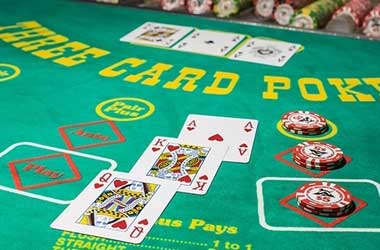
However fun they may be, casinos are businesses, and they have to make money to sustain themselves and survive on the gambling scene. They do so thanks to the house edge as casinos take a percentage of every player’s bet, from slots to roulette.
But what’s the case in games like poker, where players face each other rather than the dealer?
The secret lies in rake. If you’re not sure what rake is and how it works to casinos’ advantage, stay tuned. This article will reveal all the details behind how gambling venues and sites can afford to host many poker games and tournaments.
What Is Rake?

Rake is the percentage of money a casino keeps from the cash games and tournaments it hosts. You can think of it as a tax on your casino winnings. You can see dealers taking rake from the table in a land-based casino setting. They usually remove a certain amount of chips and set them aside.
Casinos use rake to offset various costs. Brick-and-mortar gambling establishments use it for maintenance, staff salaries, and equipment. Online gambling sites utilize it to pay for operational expenses like:
- Software maintenance
- Updates
- Customer support
Taking rake has become a standard way casinos earn profit nowadays. However, that doesn’t mean any gambling facility can take rake on their own accord. To take rake legally, casinos must possess gambling licenses and other permits. Government-authorized gambling regulatory bodies are usually the ones to provide such documentation.
Type of Rake in Casinos
Casinos calculate and take rake from cash games and tournaments in different ways. To that end, we can differentiate between:
- Fixed rake
- Drop dead rake
- Time-based rake
- Tournament fees
The following sections will explore each one in more detail.
Pot Rake
![]() Poker games casinos host are pot-based, like Pot Limit Omaha or No Limit Hold’em.
Poker games casinos host are pot-based, like Pot Limit Omaha or No Limit Hold’em.
The pot is the stack of chips that comprises all players’ bets during the game. Most of these chips go to the winner of each round, but the casino also gets to keep a small amount. This amount is called pot rake.
Most casinos limit the rake they can take from the pot in advance. We call this type of rake fixed. The limits vary from one venue to the other, but they mostly range from 2 to 10%.
The average fixed rake casinos take from the pot total is usually 3–5%.
On top of the ratio limits, some casinos restrict the amount of money they can take from an individual pot as rake. The motive behind this decision is fairness. Players often play with deep stacks and end up going all-in in the game. Without a maximum cap, rake can become two to three times bigger than it usually is in situations like these.
High-stakes poker games feature similar rules. Taking percentage-based rake from pots worth a ton of money would discourage players from ever entering these games. So, casinos usually take fixed rake from all rounds in high-stakes games.
We should also note that there are situations where casinos that typically take pot rake won’t do so. They may refrain from taking any rake from the pot in poker games that didn’t get to the flop. This rule is also known as “no flop, no drop,” and it’s usually featured in community card poker games like Texas Hold’em or Omaha.
Drop Dead Rake
![]() Drop dead rake is a subcategory of pot rake.
Drop dead rake is a subcategory of pot rake.
It represents the percentage the casino takes from each player at the table rather than just the pot winner. It’s featured in games where players take turns in the dealer’s position or the button.
The rules stipulate that each player currently on the button must provide rake before the hand starts. This process repeats throughout the game.
The total amount of money a casino will take depends on the stakes the table features. This amount is usually fixed.
Time-Based Rake
![]() Time-based rake is also known as time charge or time collection.
Time-based rake is also known as time charge or time collection.
It’s the number of money casinos take from players for sitting at particular poker tables for a particular time interval. These fees don’t depend on the number of hands you’ve played in the game or whether you’ve won or lost. They simply vary based on time you’ve spent gambling — the longer you’ve played, the bigger your fee will be.
Time-based fees are usually fixed (e.g., $10 per hour) and charged to players during or after their gambling sessions. These fees vary, but higher-stake games tend to have slightly higher rates than other poker games.
Some gambling venues collect time-based rake from the pot rather than the players. Unlike the above procedure, the money is taken from the pot over time.
Casinos adopt time-based rake collection systems for various reasons. Certain jurisdictions, like many US states, prohibit house-banked games, so casinos that operate in those territories can’t take rake regularly. Instead, they have to find other ways to earn money from their poker games. Hourly-rated fees are one of the most common choices.
In contrast, some on-site casinos rely on this charging model because they find it easier than pot rake-based one. It’s especially suitable for high-stakes games.
Tournament Fees
![]() Poker tournaments are another popular entertainment format in the gambling sphere.
Poker tournaments are another popular entertainment format in the gambling sphere.
They allow you to play against many other players and compete for chips through several rounds. Only the most successful players get to exchange the chips they’ve won for real money as a reward.
Because of this system, poker tournament pots don’t contain any real money, and operators can’t collect rake from them in the ways we’ve previously discussed. Instead, their profit comes from buy-ins.
All players interested in participating in a tournament must pay buy-ins as an entrance fee. These fees comprise two components — the money that goes toward the prize pool and the money that the casino collects as rake.
Tournament rake usually ranges between 10 and 20% of the total buy-in sum, depending on the casino.
Casinos use tournament rake to cover the expenses of organizing and hosting events. For brick-and-mortar casinos, that includes employee salaries, catering, venue expenses, and more. The costs online platforms have to cover are much smaller. As a result, online poker tournaments tend to have smaller buy-ins than land-based ones.
Nevertheless, gambling establishments’ earnings from poker tournaments aren’t big. Casinos usually aim to break even when they organize these events. They benefit in other ways.
Tournaments generate a lot of traffic, so the casino can turn a profit from guests trying their luck on their cash games like slots or roulette. They’ll also earn revenue from other services, from accommodation to food and drinks.
Should Rake Influence Your Choice of Poker Game?
It might not seem so at first glance, but rake is a factor you should consider when choosing the poker game you’d like to play. Rake has a direct effect on your expected value (EV). Expected value is the difference between the money you’ve invested (bet) in the game and the money you’ll win back.

While the money you bet stays the same regardless of the rake the game features, the rake can lower the money you’ll get back.
The higher the rake, the lower the EV.
High rakes might force you to play a tighter poker style so as not to run out of money too quickly.
There are no general rules regarding rakes casinos take on their games. You’ll have to learn what rake each game features and assess whether that table is worth joining. However, there is one exception.
Gambling venues tend to take higher rake from smaller-limit poker games.
Facilitating small-limit poker games costs are the same as any other game. However, they make casinos significantly less money than higher-limit ones because of their bet limits.
To balance out this difference, casinos increase the rake they take from these games. So, have this in mind when you’re choosing a table you want to join.
Conclusion
Taking rake has become a standard practice for casinos to earn a profit on poker games. It’s important you learn the rake the games you play feature because it can have a big influence on your bottom line.
Avoid games with high rake, a high cap, or no maximum cap, and think about them in light of other characteristics the game you’re interested in offers. This way, you’ll make sure you’re getting the most out of every gambling session.

